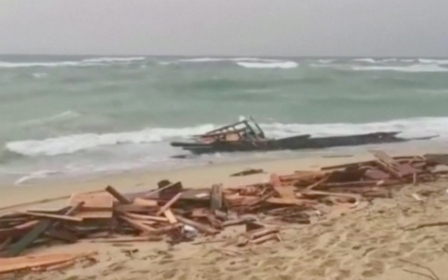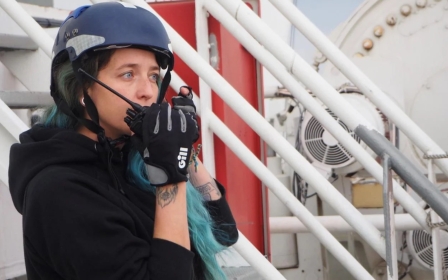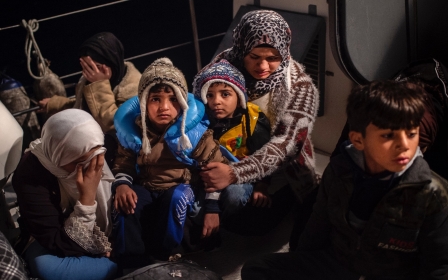Italy and Frontex could have prevented shipwreck that killed almost 100 people

A new report has revealed that Italian authorities received emergency alerts from European border agency Frontex about an impending shipwreck off the coast of Crotone in Italy on 26 February and could have prevented it.
On board were nearly 200 people, most of them refugees from Afghanistan. Ninety-four died, including 35 children.
The report, based on flight records, Frontex and Italian coastguard reports, surveillance footage and eye-witness accounts, shows that Italian authorities would have known about the vessel's vulnerabilities and the adverse weather conditions via Frontex emergency alerts.
"Do you think Italy could have saved the lives of 60+ people including some children and didn't?" Italian Prime Minister Giorgia Meloni said in an interview a few days after the incident, insisting that Frontex had not sent an emergency alert to the coastguard.
The official account is that the wooden Turkish leisure boat Summer Love sank in rough seas off the coast of Crotone, six hours after being sighted by a Frontex plane that reported that the vessel "showed no signs of distress".
New MEE newsletter: Jerusalem Dispatch
Sign up to get the latest insights and analysis on Israel-Palestine, alongside Turkey Unpacked and other MEE newsletters
But investigative reporting organisation Lighthouse Reports noted discrepancies in Frontex's and the Italian authorities' versions of events.
"They [the Italian authorities and Frontex] were saying slightly different things," Lighthouse spokesperson Klaas van Dijken told MEE. "Italy was saying that Frontex didn't send them an emergency [alert] when they spotted the Summer Love, and Frontex was saying they did, [and that] they followed the protocols.
"And that was the moment that we thought okay, there's something fishy going on here. Somebody is not telling the whole story."
Everybody was aware
Lighthouse Reports obtained a confidential report from the Frontex flight records that revealed that the Eagle 1 aircraft had encountered "strong winds" two hours before it spotted the boat.
The report of poor weather conditions was omitted from the official version of events, which also neglected to mention that the plane detected a "significant thermal response" below deck, indicating an "unusual number of people on board".
Lighthouse Reports built a 3D reconstruction of the boat to illustrate the vulnerabilities of the vessel that would have been detected by the aircraft.
It found that the wooden vessel was built for 16 passengers but carried around 200.
According to van Dijken, this would have been visible on the surveillance footage live-streamed from the plane to coastguards across the central Mediterranean and to the Frontex headquarters in Warsaw.
'These are stories that you'll remember forever'
- Klaas van Dijken, Lighthouse Reports spokesperson
"It was heavily overloaded, and that would have been visible to Frontex," van Djiken told MEE. "Everybody was aware, and they didn't send a rescue ship... and that decision had huge consequences for the people on board."
The reconstruction reveals that the two decks of the boat were over capacity.
"There were 200 people below," van Dijken said. "They all had to go up when the boat crashed... through a very narrow staircase, so a lot of people would have never made it out."
The eyewitness accounts gathered by Sky News give a harrowing insight into the wreck.
Nigeena, a 23-year-old Afghan women who had got married just four months earlier, described losing her grip on her husband's hand in the water as a wave swept him away. Days later, she found his black trainers washed up on the beach.
Another account described how Sultan Ahmed Almolki, a young Syrian boy, died from the cold as his brother tried to drag him through the water to safety.
"These are stories that you'll remember forever," van Dikjen said.
Costing Lives
According to van Dijken, the Italian authorities have said they are unable to respond to the report's allegations due to an ongoing investigation into the incident by the public prosecutor. Frontex responded that it followed protocols, but refused to respond to the allegations regarding the weather conditions on the day of the wreck.
Under Meloni, who was elected on the back of a promise to curb migration, similar wrecks could become more frequent.
Since her election in October 2022, the far-right prime minister has introduced legislation that obstructs search and rescue missions in the central Mediterranean by prohibiting rescue boats from carrying out multiple rescues on the same voyage and assigning them distant ports of disembarkation which take up to four days of navigation.
NGOs and human rights groups have warned about the deadly implications of these policies, which will leave a search and rescue gap in the central Mediterranean, deemed by the UN to be the deadliest sea border for refugees in the world.
"Italy's and Europe's focus is on stopping people [crossing to Europe], rather than offering them safety or legal pathways to claim asylum," van Dijken told MEE.
"It's costing lives, and this is the latest and one of the dirtiest outcomes of [their) policy."
This article is available in French on Middle East Eye French edition.
Middle East Eye delivers independent and unrivalled coverage and analysis of the Middle East, North Africa and beyond. To learn more about republishing this content and the associated fees, please fill out this form. More about MEE can be found here.




